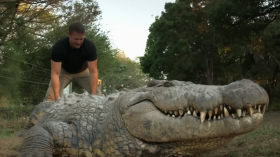Loss of wetland habitats and hunting led to the extinction of cranes in Britain, but a conservation project rearing the birds in captivity reports a pair of reintroduced cranes is incubating an egg in the wild, a first for the project and the first time a crane has laid an egg in western Britain in more than 400 years.
The Great Crane Project has been rearing cranes and reintroducing them in western Britain since 2010. The oldest pair to be released by the project just reached maturity this year.
The egg being incubated by a pair of cranes named Monty and Chris was laid on April 25; the birds have spent nearly a year at the Wildfowl and Wetlands Trust (WWT) in Slimbridge, Gloucestershire, about 125 miles west of London. They reportedly began building nests at the end of March.
A post on the Great Crane Project blog says it is unknown whether the eggs are fertile, but if they are, hatching will occur around May 25. The project has a live stream camera near the nest in the Slimbridge region, which monitors the birds and the safety of the nest.
"There is a long way to go before cranes become widespread again, but it is absolutely momentous to see this egg laid at Slimbridge," the WWT's Nigel Jarret told the BBC.
"The Great Crane Project has brought together diverse skills: breeding and rearing birds, creating wetland habitats and engaging people in conservation.
"The parents of this egg were hand-reared here at Slimbridge and have thrived through their first three years on the wetlands of the Somerset Moors, thanks to the help and support of the local community, particularly the farmers."
© 2024 NatureWorldNews.com All rights reserved. Do not reproduce without permission.





